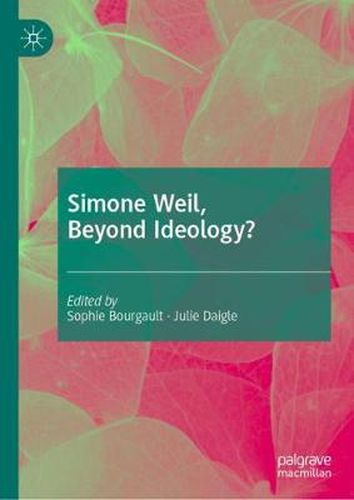Readings Newsletter
Become a Readings Member to make your shopping experience even easier.
Sign in or sign up for free!
You’re not far away from qualifying for FREE standard shipping within Australia
You’ve qualified for FREE standard shipping within Australia
The cart is loading…






This title is printed to order. This book may have been self-published. If so, we cannot guarantee the quality of the content. In the main most books will have gone through the editing process however some may not. We therefore suggest that you be aware of this before ordering this book. If in doubt check either the author or publisher’s details as we are unable to accept any returns unless they are faulty. Please contact us if you have any questions.
In the last decade, interest in the writings of French philosopher Simone Weil (1909-1943) has surged. Weil is admired for her militant syndicalism, her factory experience and participation in the French resistance, but it is above all the eclectic and rich character of her work that has increasingly attracted scholarly attention. Weil reflected on subjects as diverse as quantum physics, Greek tragedy, bankruptcy, colonialism, technology, education, and religious metaphysics, but perhaps most interesting is the way that her work seems to defy any clear ideological labelling: Marxist, anarchist, liberal, conservative and republican all seem to fall short in describing the complexity of Weil’s thinking. Adding to the interpretive difficulty is the fact that Weil often expressed biting criticisms of most things political. What this edited volume argues is that it is precisely Weil’s unclassifiable nature, combined with her sharp and sometimes ambivalent criticisms of politics, that make her work a most timely and fascinating object of study for contemporary political philosophy. It proposes a two-pronged approach to her thought: first, via a series of conversations set up between Weil and key authors in modern and contemporary political theory (e.g. Sandel, Rawls, Ahmed, Agamben, Orwell); and secondly, via a close study of Weil’s reflections on various ideologies. The goal of this book is not to position Simone Weil squarely within a single ideological tradition but rather to propose that her thought might allow us to critically engage with various ideologies in the history of political ideas.
$9.00 standard shipping within Australia
FREE standard shipping within Australia for orders over $100.00
Express & International shipping calculated at checkout
This title is printed to order. This book may have been self-published. If so, we cannot guarantee the quality of the content. In the main most books will have gone through the editing process however some may not. We therefore suggest that you be aware of this before ordering this book. If in doubt check either the author or publisher’s details as we are unable to accept any returns unless they are faulty. Please contact us if you have any questions.
In the last decade, interest in the writings of French philosopher Simone Weil (1909-1943) has surged. Weil is admired for her militant syndicalism, her factory experience and participation in the French resistance, but it is above all the eclectic and rich character of her work that has increasingly attracted scholarly attention. Weil reflected on subjects as diverse as quantum physics, Greek tragedy, bankruptcy, colonialism, technology, education, and religious metaphysics, but perhaps most interesting is the way that her work seems to defy any clear ideological labelling: Marxist, anarchist, liberal, conservative and republican all seem to fall short in describing the complexity of Weil’s thinking. Adding to the interpretive difficulty is the fact that Weil often expressed biting criticisms of most things political. What this edited volume argues is that it is precisely Weil’s unclassifiable nature, combined with her sharp and sometimes ambivalent criticisms of politics, that make her work a most timely and fascinating object of study for contemporary political philosophy. It proposes a two-pronged approach to her thought: first, via a series of conversations set up between Weil and key authors in modern and contemporary political theory (e.g. Sandel, Rawls, Ahmed, Agamben, Orwell); and secondly, via a close study of Weil’s reflections on various ideologies. The goal of this book is not to position Simone Weil squarely within a single ideological tradition but rather to propose that her thought might allow us to critically engage with various ideologies in the history of political ideas.